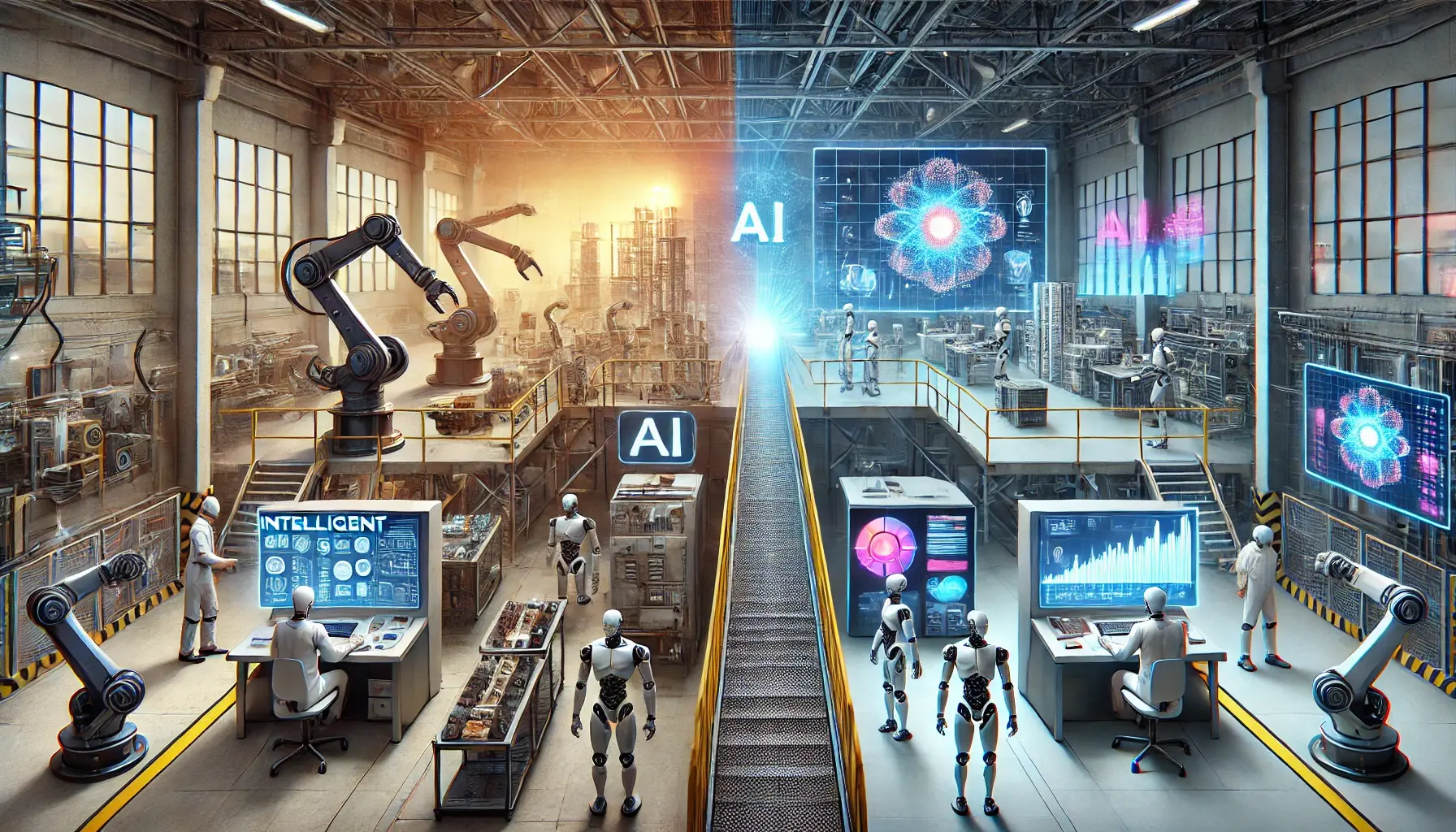Intelligent Automation AI vs Traditional Automation: Why Businesses Must Evolve
Let’s be honest. Are you tired of dealing with inefficient workflows, endless manual tasks, and systems that just don’t work together? Is your team bogged down with repetitive activities while the competition races ahead with smarter, faster solutions? You’re not alone, but there is a way forward.
Intelligent Automation AI isn’t just another tech buzzword. It’s a transformative solution that eliminates inefficiencies, automates decision-making, and scales alongside your business. Unlike outdated traditional automation, it learns, adapts, and empowers your team to focus on strategy and growth—not mundane tasks. And with the Henson Group as your trusted partner, integrating these tools into your business has never been easier.
The Pain Points of Traditional Automation
While traditional automation has played a significant role in improving operational efficiency, it falls short in addressing the growing complexity and demands of modern businesses. Let’s dive deeper into the challenges organizations face with outdated automation systems:
1. Limited Flexibility
Traditional automation relies on pre-defined rules and workflows, making it rigid and unable to adapt to changing business needs. For instance, if there’s a shift in market trends or customer behavior, traditional systems require extensive manual reprogramming, delaying critical responses and reducing agility.
2. Data Silos and Fragmentation
Many businesses struggle with data scattered across multiple systems and formats. Traditional automation systems cannot process unstructured data, such as emails, images, or social media interactions, leaving valuable insights untapped. This lack of integration results in incomplete data analysis and hinders effective decision-making.
3. Lack of Decision-Making Capability
Traditional automation excels at repetitive tasks but lacks the ability to analyze situations or make decisions. Businesses relying solely on these systems often miss opportunities to optimize processes or proactively address challenges because the systems lack intelligence and contextual understanding.
4. Scalability Issues
As businesses grow, their operations become more complex. Traditional automation struggles to scale efficiently, requiring significant manual intervention to handle increased workloads or more intricate workflows. This limits the potential for growth and adds unnecessary operational costs.
5. Inability to Meet Customer Expectations
Modern customers demand real-time, personalized interactions. Traditional automation systems cannot analyze customer behavior or deliver tailored responses, leaving businesses at a disadvantage in highly competitive markets.
The Solution: Intelligent Automation AI
What is Intelligent Automation AI?
Intelligent Automation AI combines the power of artificial intelligence (AI), machine learning (ML), and advanced analytics with traditional automation tools. It enables businesses to:
- Process unstructured data.
- Automate decision-making.
- Adapt to changing environments without manual reprogramming.
How Intelligent Automation AI Can Transform Your Business
1. Automate Repetitive Tasks
Say goodbye to hours wasted on mundane tasks. With Intelligent Automation AI:
- Automate email drafting in Outlook using AI-powered templates.
- Create professional presentations in PowerPoint in seconds with intelligent design suggestions.
- Generate complex reports in Excel, complete with actionable insights.
This automation frees up your workforce to focus on higher-value, strategic work that drives growth.
2. Deliver Hyper-Personalized Customer Experiences
Today’s customers expect experiences tailored specifically to them. Intelligent Automation AI makes this possible by:
- Using Dynamics 365 to craft personalized marketing campaigns.
- Providing product recommendations powered by Azure AI.
- Automating real-time customer interactions with AI chatbots.
This level of personalization builds stronger customer relationships and improves retention.
3. Drive Smarter Decision-Making
Turn unstructured data into powerful insights with tools like Power BI integrated with AI models. With Intelligent Automation AI, businesses can:
- Identify market trends with predictive analytics.
- Make data-driven decisions backed by AI-generated insights.
- Optimize operations based on actionable intelligence.
4. Foster Creativity and Innovation
AI isn’t just about efficiency—it’s a catalyst for creativity. With Intelligent Automation AI:
- Generate engaging social media content in moments.
- Develop innovative product concepts and branding ideas.
- Automate A/B testing for marketing campaigns, helping you discover what resonates with your audience.
Key Differences: Traditional Automation vs Intelligent Automation AI
|
Feature |
Traditional Automation |
Intelligent Automation AI |
|
Data Processing |
Structured data only |
Structured and unstructured data |
|
Adaptability |
Rule-based and static |
AI-powered and dynamic |
|
Learning Capability |
No learning; manual updates required |
Learns and improves over time |
|
Decision-Making |
Rule-based decisions only |
Data-driven, intelligent decisions |
|
Scalability |
Limited scalability |
Highly scalable across complex processes |
|
Use Cases |
Repetitive, routine tasks |
End-to-end process automation and innovation |
Why Businesses Must Evolve
a) Meet Growing Customer Expectations
Today’s customers demand faster, more personalized interactions. Traditional automation cannot analyze customer behavior or deliver tailored responses. With intelligent automation AI, businesses can:
- Provide real-time, personalized customer service through AI chatbots.
- Tailor marketing campaigns based on predictive analytics.
- Anticipate customer needs using advanced data models.
b) Handle Complex and Unstructured Data
Businesses generate massive amounts of unstructured data from emails, social media, and customer interactions. Traditional systems can’t process this data effectively. Intelligent automation AI can analyze and draw insights from unstructured data, enabling businesses to:
- Make informed decisions faster.
- Identify trends and opportunities.
- Optimize workflows with real-time insights.
c) Increase Agility and Scalability
In a rapidly changing business environment, adaptability is crucial. Intelligent automation AI enables businesses to scale operations seamlessly and adapt to new challenges without reprogramming.
For example:
- Retailers can adjust supply chains in response to changing demand.
- Financial institutions can automate fraud detection for evolving threats.
- Manufacturers can optimize production schedules dynamically.
d) Drive Cost Savings and Efficiency
While traditional automation reduces manual effort, it often falls short in high-cost areas like decision-making and process optimization. Intelligent automation AI delivers:
- Greater accuracy, reducing costly errors.
- Faster turnaround times for complex processes.
- Lower operational costs through smarter resource allocation.
Why Choose Henson Group for Intelligent Automation AI?
Adopting intelligent automation AI requires expertise to ensure seamless integration and maximum ROI. That’s where Henson Group comes in. As a trusted Microsoft Gold Partner, Henson Group specializes in deploying Microsoft’s AI solutions tailored to your business needs.
a) Expertise in AI and Automation
With decades of experience, Henson Group ensures that intelligent automation solutions are seamlessly integrated into your workflows, minimizing disruptions and maximizing value.
b) Industry-Specific Solutions
No two businesses are the same. Henson Group designs intelligent automation solutions tailored to your specific industry, whether it’s healthcare, finance, retail, or manufacturing.
c) End-to-End Support
From initial consultation to implementation and ongoing optimization, Henson Group provides comprehensive support to help you unlock the full potential of intelligent automation AI.
d) Proven Results
Henson Group has helped businesses:
- Increase productivity through advanced automation.
- Improve customer satisfaction with personalized AI tools.
- Achieve measurable cost savings and efficiency gains.
Conclusion: Intelligent Automation AI Is the Future
Traditional automation served as a vital first step toward efficiency, but it’s no longer enough to stay competitive. Intelligent Automation AI represents the next evolution, offering unmatched adaptability, scalability, and decision-making capabilities. By embracing this technology, businesses can transform their operations, exceed customer expectations, and secure long-term growth.
With Henson Group’s expertise, adopting intelligent automation AI has never been easier. As a trusted Microsoft partner, we’ll help you integrate cutting-edge AI solutions to revolutionize your business processes.
Ready to evolve? Contact Henson Group today to learn how intelligent automation AI can transform your organization.
FAQs: Intelligent Automation AI
Q: How does intelligent automation AI differ from traditional automation? A: Unlike traditional automation, which relies on static rules, intelligent automation AI uses machine learning and predictive analytics to handle complex, dynamic processes.
Q: What industries benefit most from intelligent automation AI? A: Industries like healthcare, finance, retail, and manufacturing can significantly benefit from intelligent automation AI due to its ability to process unstructured data and make data-driven decisions.
Q: How quickly can intelligent automation AI be implemented? A: With Henson Group’s expertise, intelligent automation AI solutions can be integrated seamlessly, minimizing downtime and ensuring rapid adoption.


